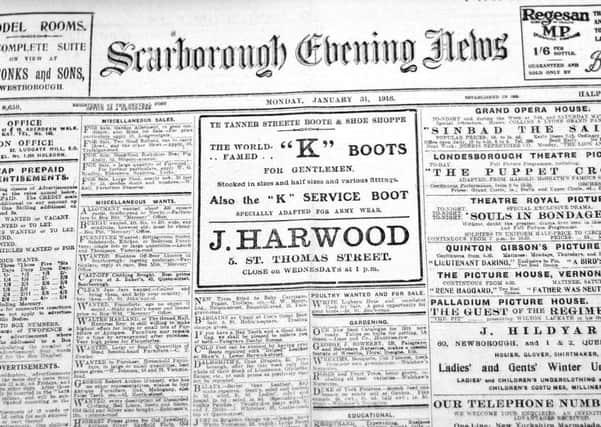1916 court: Landlord found drunk on his own premises


Defendant was represented by Mr GE Royle and a plea of not guilty was advanced.
Sergeant Hick said about 2.45pm on the day in question he was on duty in St Helen’s Square in company with PC Lawson when he saw the defendant turn out of Newborough. He was drunk and went down Bland’s Cliff into the Bell Hotel. Witness went to the hotel and found the defendant standing in the centre of the smoke-room. Witness said to him: “You have no right to be on the licensed premises, as you are drunk.” He replied: “You are all right and so am I.” Witness told him to go down into the kitchen, but he refused to go and witness locked him up.
Advertisement
Hide AdAdvertisement
Hide AdReplying to a question, Sergeant Hick said he knew a licensed holder might be drunk in his own private apartments, the kitchen, for instance, but not in any other part of the house, the bar etc.
Cross-examined by Mr Royle, witness did not notice two men making a trench outside the hotel door. Defendant did not ask to be examined by a doctor to prove his sobriety.
PC Lawson gave corroborative evidence, and deposed to the loud noise defendant kept up at the walls etc. Replying to the Mayor, witness said he first noticed defendant was drunk by the way he staggered down Bland’s Cliff.
Warrant Officer Oldroyd also deposed to defendant’s drunken condition. Whilst in the cell he frequently cried out to be released. This, said Mr Royle, was the greatest proof of his intelligence and sobriety (laughter). Continuing, Oldroyd said when he saw the defendant he was propped up against the wall of the cell with his head hanging on his chest.
Advertisement
Hide AdAdvertisement
Hide AdThe next witness to bear out the condition of the defendant on the afternoon in question was PC Taylor, who gave a “vivid” representation of defendant’s gait and bearing, and the things he said while in his alleged intoxicated state. At the close Mr Royle said, amidst much laughter in which the magistrates heartily participated: “You are mistaking your avocation – you ought to be a Charlie Chaplin.” Continuing, PC Taylor said defendant was too drunk to be excited – Mr Royle: “Well! You’re a masterpiece! It’s what I call oriental imagination.”
Evidence for the defence was given by Hasland Pickard, a man in the employ of the Gas Company, who was occupied in digging a trench outside the hotel on the afternoon in question. Witness, who said he was a strict teetotaller – extremist Mr Royle called it – said he saw the defendant coming down Bland’s Cliff in the direction of the hotel. He did perhaps stagger a little, but not much. He made a detour round the trench and went into the house. Witness was surprised to see him leaving the hotel later in the custody of the police officers. Questioned further by Mr Royle witness said he had seen men staggering about the streets a good deal worse than the defendant, who had not been arrested by the police.
Mr G Rowntree: “Was the man drunk?” “He might have had a few gills.”
Mr Royle: “Thank you, that’s good enough for me.”
The bench thought this was not a proper answer to Mr Rowntree’s question.
Advertisement
Hide AdAdvertisement
Hide AdMr Royle strongly objected and an altercation followed. Rising up heatedly Mr Royle, facing the bench, said: “I know a man on the bench this morning who, if he knows a man has had one gill, will dare to say that man was drunk.”
Mr Rowntree: “After the remark Mr Royle has made I will ask that the question be put to Pickard through the chair.”
The Mayor: “In your opinion was the man drunk or not?” “Slightly.”
Mr G Rowntree: “Slightly?” “Yes.”
John Appleby, also in the employ of the Gas Company and who was working with the last witness outside the hotel on the particular afternoon, said, replying to Mr Royle, he was an absolute teetotaller. He was surprised at the police “taking the defendant along.” The latter might have had a glass or two, but not much.
Advertisement
Hide AdAdvertisement
Hide AdMr Royle: “In your judgement, if you saw him walking about ordinarily in the street would his manner be such that it would warrant his being locked up?” “No, I do not think so.”
The chief: “Did the man stagger?” “He might have staggered a little.”
Mr Royle addressed the magistrates at length, and asked that defendant be placed under the First Offenders’ Act.
The magistrates deliberated in private, and upon returning into court, the mayor announced they found the case proved. Defendant would be fined 5s. They took that lenient view, taking into consideration the fact that Mr Atkinson had been detained for some hours in the police cells.